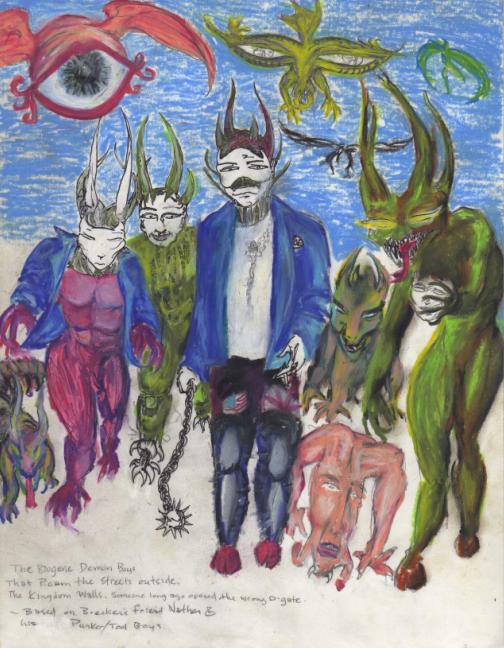|
|||||||||||||
|
A Dissertation on Drug Use By Punkerslut
On Rights and Liberty... I have already written a great deal on the matters of rights and liberties in other articles, especially the piece "Mind-Altering Substances." Yet, this article would be incomplete if I entirely ignored this essential topic, so I shall briefly discuss it... When I speak of rights and liberty, I mean that men and women should not be obstructed from doing their heart's desire, as long as they do not impose on the freedom of others. That a person can following the path of their soul, majestically, reflectively, personally, to be able to do this is a sign that our age has reached the quest for liberty. Freedom has always been described as a bird and slavery always as a cage, and this analogy is not entirely false. When we look to the skies and see that there is no place that a flighted creature cannot go, we see that their behavior is a mirror to how we feel when we are free. It is at this point, when the valleys in a man's heart are covered in flowers, when the forests of a woman's mind are filled with the sounds of creatures, it is here, on the inside, that a person can fully realize that they are free. For when we look at the physical world around us, we will find a blank canvas, and whether we see artwork and poetry expressed through nature and mankind, or whether we see chains and bondages to our goals, the question can be answered with whether we are free on the inside. So, I submit that freedom and liberty are essential to the honest and sincere development of a person, that they may become an individual, not for those around him, but for himself. Every person whose life is devoted to liberating others is already free... It is in this spirit that I believe that a person has the right to use drugs. It is no secret that drugs have been used in many religions to help people attain understanding and spirituality. Mescal, Dhatura, Psilocybe Mushrooms, Amanita Muscaria Mushrooms, Morning Glory seeds, Hawaiian Baby Woodrose seeds, and even Marijuana, all of these have been used by ancient cultures to increase a person's emotional understanding of meaning and significance. Often times, when I have spoken of religion, it has been with great disdain and almost pure animosity. But this attitude is only in response to what the Western World knows of religion, of the great religious wars, of the persecution of minorities, of the oppression by organized religion. In our history books, when one reads of torture chambers, they inevitably will also read of the religious authorities that also used them. Yet in these "primitive" cultures, of the Native Americans, of the Native Cubans, of the Jamaicans, we find a substance that is capable of expanding a person's mind. It is a key to unlocking repressed memories, a path to our inner selves, a journey that combines all of experiences of the past together into one powerfully moving time. Beyond anything else, it is a learning experience. These drugs will change these people forever, but the change is of a positive nature. If a widow had the great misfortune of losing her lover, what can be said of a substance that could give her several hours of living her memories with the person that loved her so much? If a person saw no meaning of the occurrence of their daily lives, what could be said of a mushroom that transformed every action into an expression of affection, every thought into an eternal philosophy, even when it wore off? If a man wanted to end his life because he saw that there was no point to living, and he decided to use a drug that taught him that the end of every action is purpose, that true success only comes from touching the lives of those we love; if a suicidal person used a Hallucinogen that convinced them of this, how could we oppose it?
The Nature of Drugs... There is an enormous gap between recreational drug use and normal recreational activity in their nature. When a purpose engages in a recreational activity, it is for an end of some kind. A person will climb a mountain, for instance, to get a sense of accomplishment, or beauty, or appreciation, or inspiration, or simple pleasure. The same can be said of those who build models, or who enjoy nature walks, or who produce music, paint, write, or any other activity. No person engages in the activity for itself, but rather, they do it to reach some end result. In drugs, this differs greatly. When a person engages in drug use, they effect of accomplishment, spirituality, understanding, happiness, is already caused, simply by taking in the substance. This is how drug use differs from normal activities: they create an artificial in the mind of a person. Of course, one may argue that someone takes a walk in the forest if they want inspiration, or a person can take a pill for inspiration, but in both cases the person does something, to get an effect. Though this may be true, the mechanics of drugs and normal activity still differ, because a drug artificially causes the emotions, whereas the emotions of a man who engages in sober activity are completely natural. This is not an argument against drug use or for sober activity, or vice versa, but rather, simply a statement so that drugs are properly understood. It must be further understood that all emotions arising from sober activity are caused by chemicals not at all dissimilar to drugs. For instance, Estrogen, Testosterone, and Adrenaline, are all capable of altering the mood of the person with this chemical in their blood stream. They are capable of producing violent or sexual tensions. When Endorphins, Serotonin, or Dopamine are released from the brain of a person, they produce happiness and euphoria. How do normal drugs work on the body? Sometimes, they cause the brain to release great amounts of Endorphins, Serotonin, or Dopamine. Sometimes not. In either case, the reason why a person gains pleasure from an activity is due to their brain releasing these chemicals in their brain. The reason why a person gains pleasure from drugs is because it has a similar effect on the brain as the "happy chemicals," or it causes the brain to release these chemicals. In this light, it almost seems ridiculous that drugs are at all to be prohibited. When a person eats a piece of bread, their mind will release a hormone that makes them feel content. The law will call this something natural and not to be interfered with. Yet, when a person takes a pill that produces nearly the same effect (most likely to a much higher degree), the law will put this person behind bars. It is hypocrisy to a great extent, but there is nothing more common among the authorities than ignorance, or even willful ignorance. The Ethical Dilemma of Finding Heaven...
There seems to be an ethical dilemma arising out of euphoria. For instance, if a person found a drug that made them completely happy and content, for what reason should they explore the world, or even do anything productive? What would keep them from recreating all the time? Well, the question really isn't strictly related to drugs. For instance, what if an activity caused a great deal of pleasure, and people did that all the time? The question really does not lay with drugs, but rather, with a person's mindset towards recreation. It is true that there are people who do nothing but drugs, yet I know a great deal of people who have told me that their favorite activity is sex and that is all they try to do. Essentially, modern thinkers (if the term can suffice) are scared to death of the realization of a heaven. It is almost believed that if a person enjoys drug use, that they are committing an immoral action. In no respectable manner can I say that putting a substance into your body, willingly and knowingly, is at all unethical. If a person accidentally overdoses on a drug and experiences great pleasure, no doctor will condemn them as a bad person or junkie, or even an immoral person, but if they willing use a drug for pleasure, then they are regarded as an addict and a junkie. This varies greatly from another scenario. If a leader orders a bombing of a small nation, it is a violation of ethics whether done an accident or on purpose. Essentially, this demonstrates the absurdity of the idea that drug use itself can be immoral.
Drug Use... It has almost always been assumed that any drug use is reckless and purely recreational drug use. However, after interviewer and knowing many drug users, I have found that drug use can be an advancement to civilization. One drug user reported to me that when they experience Road Rage while driving, they take one Xanax (Alpralozam) pill and it calms them down. Another drug user, who enjoyed use of Xanax, gave me the testimony when they were on the drug, "Right now, you could call me any name, steal from me, rob me, anything, and I wouldn't be able to hate you." After personal use of this drug, I can confirm that the effects are quite soothing, calming, relaxing, regardless of environmental conditions. Consider, for this one instance, the amount of victims of Road Rage, amounting in property damage and worse still, the loss of one who may have given us purpose in living -- then consider the government outlawing a way to prevent it. When watching the movie "Requiem for a Dream," I noticed one scene where a character uses uppers and thoroughly cleaned out her entire house. This reminded me of a friend I knew who similarly do uppers whenever his parents requested him to clean the house. I had noticed with one of my drug experiments, that high amounts of Psuedophedrine can be used to keep a person awake, without incurring the normal effects of drowsiness, exhaustion, or irritability. I remember how I had to take the GED test at 8:00 A.M. in the morning, about the time I usually go to sleep, so I decided to take 240mgs of Psuedophedrine, and it kept me awake. One of my friends was giving caffeine pills to help him stay away, but when I informed him of Psuedophedrine, he started using it with success. He then remarked to me, "With the effects of caffeine compared to this, it seems silly to think I ever thought caffeine was at all useful in the first place." We also discussed how it can produce a reflective attitude about the world. One drug user, who attempted to commit suicide one time, told me that use of LSD-25 gave him a new vision of life. He has since been much happier. In the Ditman Study, which gave questionnaires to individuals who had been provided with LSD-25 by the experimenters, reported that out of 74 subjects, 72% reported that they had "a very pleasant experience," 64% said it gave "greater awareness of reality," 50% said it "was of lasting benefit," and 49% said it was "the greatest thing that ever happened to me." In the Savage Study, out of 96 people, 85% reported that it was "a very pleasant experience," 92% said it gave a "greater awareness of reality," 85% said they "feel it was of lasting benefit," and 78% said it was "the greatest thing that ever happened to me." Only one person in each group reported that it "did me harm mentally." 47% of the Ditman Study and 86% of the Savage Study said they had "a greater understanding of the importance and meaning of human relationships." 38% of the Ditman Study and 78% of the Savage Study reported that after the experience, they had "a sense of greater regard for the welfare and comfort of other human beings." 42% of the Ditman Study and 64% of the Savage Study reported that it "improvement was noted by person closest to me." In the Ditman study, 36% reported that they had "more initiative since LSD," 34% said they had "less anxiety," 46% said they found "deeper significance to things," 39% said that "problems seemed less important," 38% said they were "more accepting of ideas," 37% said they were "more broadminded," and 33% said "problems such as emotional, financial, drinking, legal, etc., improved." In the Janiger Study, out of 194 subjects, 18% reported they had increased interest in "social reform," 35% had interest in "morals and ethics," 48% said they had interest in "other universal concepts (meaning of life)", 45% said the positive change noticed by person closest, and 61% reported that it was "an experience giving greater understanding of myself and others." In the same study, 75% suggested LSD use for "becoming aware of oneself," 58% suggested it for "gaining new meaning to life," and 42% suggested using it for "getting people to understand each other." [Resources: The Psychedelic Reader, edited by Timothy Leary, pages 16 to 18.] I suggested a friend of mine to use Dextromethorphan to help her gain insight, meaning, and purpose, and she reported to me, "I felt like I was looking at the events of my life for 1,000 years." Whenever I use this drug, is a portal back to every event of my existence, and I get to see again the things that made me who I am, the thoughts that transpired in my mind to give rise to my creeds of today...
Punkerslut,
|






